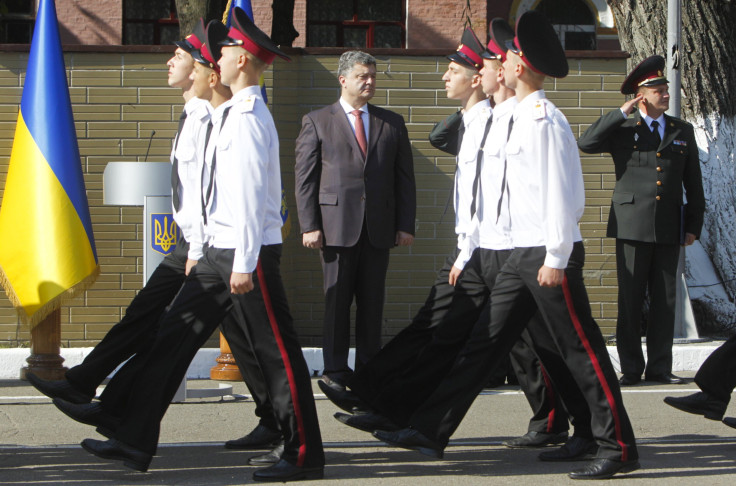Ukraine Accuses Russia Of 'Open Aggression' As Rebels Advance

(Reuters) - Ukrainian President Petro Poroshenko accused Russia on Monday of "direct and open aggression" which he said had radically changed the battlefield balance as Kiev's forces suffer major reverses in the war with pro-Moscow separatists.
Ukraine's military said its forces had been ordered to pull back from a vital airport in the east of the country, near the city of Luhansk, where they had been battling a Russian tank battalion.
Poroshenko said in a speech there would be high-level personnel changes in the Ukrainian armed forces, whose troops fled a new rebel advance in the south which Kiev's Western allies say has been backed up by Russian armored columns.
Russian President Vladimir Putin, who called on Sunday for immediate negotiations on the "statehood" of southern and eastern Ukraine, blamed Kiev's leadership for refusing to enter into direct political talks with the separatists.
Putin also hoped "common sense" would prevail in the West over the possibility of imposing additional economic sanctions, despite Moscow's denials that it is helping the rebels.
Until last week Ukraine had appeared close to crushing the four-month rebellion in the east, which erupted after a pro-Moscow president was forced out of power by popular protests. But then the rebels opened a new front to the south on the coast of the Sea of Azov, pushing towards the city of Mariupol.
Poroshenko repeated Kiev's belief that Russian forces are helping the rebels to turn the tide of the war.
"Direct and open aggression has been launched against Ukraine from a neighboring state. This has changed the situation in the zone of conflict in a radical way," he said in his speech at a military academy in Kiev.
Speaking during a visit to Siberia, Putin repeated his call for talks. "The current Kiev leadership does not want to carry out a substantive political dialogue with the east of its country," state news agency Itar-Tass cited him as telling journalists.
Putin also said the separatists were trying to force Ukrainian troops from their current positions where they were firing on civilian targets. "The aim of the militia fighters is to push away these armed forces and their artillery to not give them the possibility to shoot on residential areas," he said.
"NEW RUSSIA"
On Sunday, Putin's spokesman said the president's call for talks on the "statehood" of southern and eastern Ukraine did not mean Moscow now endorsed rebel calls for independence for territory they have seized.
Asked if "New Russia", a term pro-Moscow rebels use for their territory, should still be part of Ukraine, spokesman Dmitry Peskov said: "Of course."
"Only Ukraine can reach an agreement with New Russia, taking into account the interests of New Russia, and this is the only way to reach a political settlement."
Nevertheless Kiev and its Western allies remain suspicious of Putin's actions. German Foreign Minister Frank-Walter Steinmeier suspected Moscow might be trying to create a land corridor to supply Crimea, a region it annexed from Ukraine in March but which has no frontier with Russia.
"Russian land bridges and corridors would be just as illegal and deplorable as its annexation of Crimea," he was quoted by the Maerkische Allgemeine newspaper as saying.
Putin made his statehood remarks two days after comparing the Kiev government with Nazis and warning the West not to "mess with us". Europe and the United States are preparing possible further economic sanctions to halt what they say is direct Russian military involvement in the war in Ukraine.
"I hope that common sense will prevail and we will work in a normal modern way," the Interfax news agency reported Putin as saying.
His Foreign Minister Sergei Lavrov said any new sanctions from the European Union or United States would force Russia to protect its economy, citizens and businesses.
The United States and EU first imposed the sanctions after the annexation of Ukraine, and targeted Russia's financial, defense and oil industries in July after a Malaysian airliner was shot down over rebel territory, killing 298 people.
Moscow has responded by banning the import of most Western foodstuffs and shutting down McDonald's restaurants but so far energy shipments to the EU have been unaffected.
PROTECTING OUR ECONOMY
In the case of yet tighter sanctions, Lavrov said, "we will first of all start from our own interests - protect our economy, protect our social sphere, protect our businesses and at the same time draw conclusions from the actions of our partners".
Lavrov said there would be no military intervention from Russia in Ukraine. Moscow denies the presence of Russian tanks and troops there, despite what NATO and Western governments have said is overwhelming evidence to the contrary.
The conflict moved onto the sea for the first time on Sunday when the separatists said they had fired on a Ukrainian vessel in the Azov Sea using land-based artillery.
A Ukrainian border guard official said on Monday that the naval cutter had been sunk. "We managed to save eight sailors, thanks to other cutters coming to their rescue. Seven of them are injured or burned. Two sailors have gone missing. We are continuing rescue operations," the official, Serhiy Astakhov, told Reuters.
© Copyright IBTimes 2024. All rights reserved.











